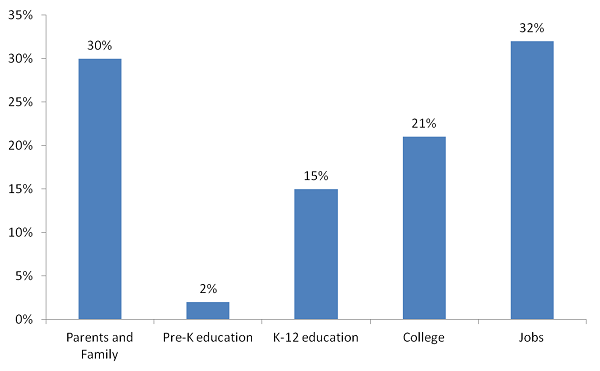The challenge of improving social mobility has been pushed up the agenda by President Obama’s recent speech, in which he set out his case for investment in pre-k education, parenting, school reforms and a higher minimum wage to make work pay.
Blue mobility, red mobility
Politicians on both sides of the aisle echo the President’s desire to improve opportunity in the U.S., while diverging on the necessary means. While Obama set out the role for government in promoting equality and fairness, leading Republicans see the state as the enemy of social mobility: families, communities, and markets are the key ingredients
Congressman Paul Ryan argues higher taxes, more regulation, and heavy entitlement spending stand in the way of the market dynamism necessary for “equal opportunity for all under a limited constitutional government of popular consent.”
What’s most important for mobility? The popular view
But what do ordinary folks think? Asked “which of the following do you think is best able to promote social mobility (e.g., opportunity)?”, respondents to our survey ranked jobs as most important, with “parents and family” close behind:

College seen as more important than pre-k by a factor of 10
Only a handful of Americans believe that pre-k education is the “most important” in terms of promoting opportunity. Of course, it is hard to argue that one year of pre-k is more important than family, school through to the age of 18, or landing a job. But the comparison with college–seen as “most important” for mobility by one in five respondents–is striking, given the growing attention to the early years agenda in policy-making circles.
Taken together, the three educational elements (pre-k, K-12 and college) attracted 38% support. Broadly, then, U.S. citizens rank education, jobs, and family as about equally important in terms of promoting a more socially mobile society.
Mobility and the lifecycle
Our own work at Brookings shows that interventions are needed at every life stage, and sustained over a long period of time to make any serious progress on the mobility front. This means, for one thing, that support for policy from both sides of the political divide will be needed.
But those of different political persuasions turn out to have different views on the matter: more from us on this tomorrow.
The Brookings Institution is committed to quality, independence, and impact.
We are supported by a diverse array of funders. In line with our values and policies, each Brookings publication represents the sole views of its author(s).

Commentary
Education, Jobs and Family: What Ordinary Americans Think Matters for Social Mobility
December 10, 2013